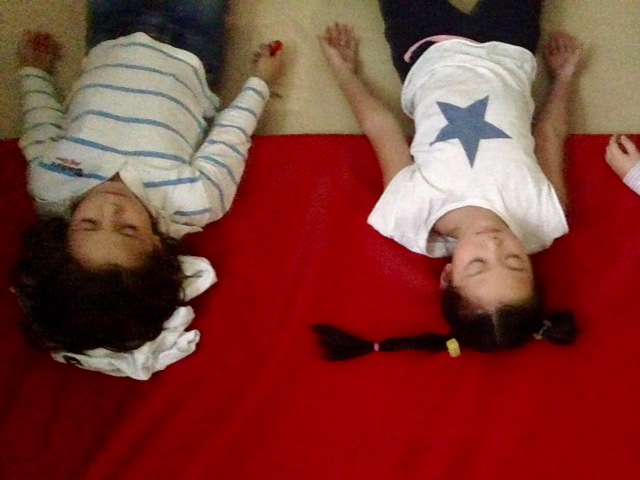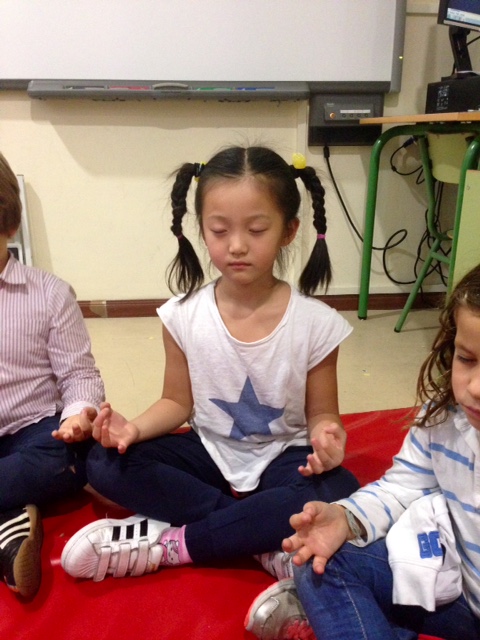Mindfulness Meditation in a School Library
Mindfulness helps pupils to be able to take a breather and to start to understand their changing moods
We are the school library of an International Bacchelaureate (IB) bilingual school, Colegio de San Francisco de Paula, based in Seville, Spain. The school covers students from 3 to 18 years old, and we have in place the IB Middle Years (MYP) and Diploma (DP) Programmes and we are a Primary Years candidate (PYP).
Increasingly the aims of the school are focused on the personal wellbeing of the children and staff as well as academic achievement. In the library, our main purpose is to promote reading for pleasure and to encourage children to become lifelong independent learners. As an IB school, Colegio de San Francisco de Paula promotes the Learner Profile and Approaches to learning. Both of these aspects focus on the child from a holistic perspective.
As well as library resources for the students we have resources for teachers and parents which we are continually adding to.
During the past two years we have been introducing short mindfulness meditations to children in years 1 to 4 of Primary when they come into the library. We started this to help celebrate the School Day of Non-Violence and Peace (30th January each year) in honour of Mahatma Gandhi. We did a mini meditation with the classes that came into the library that day and one class particularly took to it.

Following this we did a brief meditation each week when the class came to the library. It was interesting to hear them excitedly talk about their experience when we finished. One week we were keenly listening to sounds furthest away from us and then the sounds closest. "What could you hear furthest away?" "Grass growing says", one little boy, "the world" says another.
Spurred on we started to do regular sessions with more classes (years 1 to 4). The short mindfulness exercises we do are based on the “Smiling Mind” Program which is a free Australian program offering excellent online resources including guidance for teachers. Increasingly “mindfulness” has been found to be beneficial to children and adolescents helping them to deal with stress and emotions and to improve their ability to pay attention. Emily Campbell has done a useful round-up of current research for the “Greater Good Science Center” based at University of California, Berkeley2.
Exercise to focus, relax and understand your moods
One exercise we do is “the internal weather check” were children spend a few minutes sitting quietly, first focusing on their breath to help them to feel relaxed and centred and then they examine how they are feeling inside (in terms of the weather). We have all kinds of weather – lots of sunny children, some cloudy and rainy and the occasional snowstorm or hurricane. The exercise helps children to come to understand that moods change and pass like the weather and the cloudy and rainy children perk up with the thought that the sun might come out later.
Another super resource we use is the book by Eline Snel “ Sitting still like a frog”, which comes with an audio CD with mindfulness practices. One day we were practicing one of the exercises with a group of year 1 children (age 6) at the start of their library class. At the end of the exercise the narrator instructs the listeners to gently open their eyes, get up and go about their day. The teacher and I were very surprised when they all got up and went to leave the library!
However, it´s not all plain sailing! It is important to note that mindfulness is not a tool to help keep children quiet, rather it helps them to be able to take a breather and to start to understand their changing moods. There are always days when everything goes pear shaped and it needs a certain commitment and determination to keep going.
Two of our library team are keen yogis and as well as the “Mindfulness” practices we have run yoga sessions for teachers (a couple of end of terms sessions for all staff plus a regularly weekly after school class) and a Saturday morning session exploring yoga and poetry for children and their parents. For this session we picked a selection of nature and romantic poetry and recorded some of the children reciting the poetry. We then used the recordings on the day, using the poetry and yoga to explore the beauty of the world around us.

As well as the relaxation benefits of the activities it has also helped us to forge better relations with staff and to encourage more parents to use the library. The teachers are often delighted to start their library class with a few moments of peace and tranquility!
Author:
Marie Curtis
Librarian, Colegio San Francisco de Paula
Seville, Spain
marie.curtis@sfpaula.com
References:
Anguita, María: Yoga para pequeños exploradores. 2011
Costa, Arthur L. and Kallick, Bena (eds.): Habits of mind across the curriculum : practical and creative strategies for teachers 2009
Freeman, Donna: Once upon a pose: a guide to yoga adventure stories for child 2009
Garth, Maureen: El espacio interior: meditaciones para todas las edades, de los 9 a los 99 años. 2013
Garth, Maureen: Luz de estrellas. 2010
Garth, Maureen: Luz de la tierra. 2012
Garth, Maureen: Rayo de luna. 2011
Guber, Tara: Yoga pretzels : 50 fun yoga activities for kids & grownups. 2005
Kabat Zinn, Jon: Mindfulness en la vida cotidiana : donde quiera que vayas, ahí estás. 2012
Murray, Lorraine E.: Calm kids : help children relax with mindful activities. 2012
Purperhart, Helen: The yoga adventure for children : playing, dancing, moving, breathing, relaxing. 2007
Purperhart, Helen: Yoga exercises for teens : developing a calmer mind and a stronger body. 2009
Salinas, Zulema: Yoga from 36 months. 2010
Snel, Eline: Sitting still like a frog mindfulness exercises for kids (and their parents) [Kit] 2013
Snel, Eline: Tranquilos y atentos como una rana la meditación para los niños…con sus padres [Kit] 2013
Solis, Sydney: Cuentos para aprender yoga : Cómo enseñarles yoga a los niños mediante el uso de cuentos. 2006
Thapar, Mini: Yoga para niños : con divertidas historias. 2008
The MindUp curriculum : focused classrooms, mindful learning, resilient students. Grades 3-5. 2011
The MindUp curriculum : focused classrooms, mindful learning, resilient students. Grades 6-8. 2011
The MindUp curriculum : focused classrooms, mindful learning, resilient students. Grades Pre-K-2. 2011